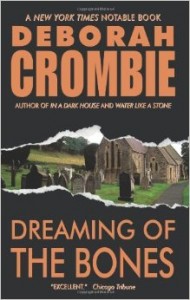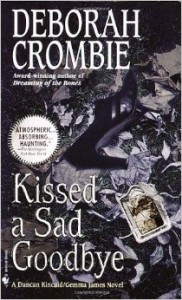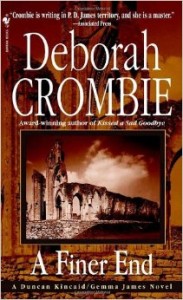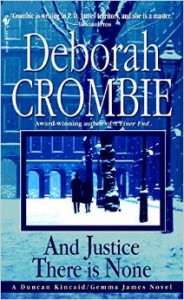 Dreaming of the Bones
Dreaming of the Bones
After making my way through the first four books in this series with reasonable alacrity, I really stalled out on Dreaming of the Bones at first. A large part of the problem for me was that it had to do with the death of a poet five years prior, and was thus strewn with quotations of both poetry and flowery letters.
Once I summoned the fortitude to continue, however, I ended up enjoying the book well enough. We are introduced to Victoria, Duncan’s ex-wife, and I appreciated that both of them are painted sympathetically. Their relationship falling apart was no one’s fault in particular, and both have the wisdom now to recognize that. Victoria is on the English faculty at Cambridge and is working on a book about poet Lydia Brooke, whose death was presumed to be suicide. Victoria suspects otherwise and Duncan (as usual) keeps an open mind about her instincts and agrees to look into things even though the local police are not exactly enthusiastic about him poking around.
Although I generally prefer stories where Duncan is assigned to the case of a stranger, Vic’s involvement did offer many emotional consequences for Duncan. Too bad there really weren’t any consequences for the rule-breaking and jurisdiction-trampling he engaged in throughout. Also, I really disliked that Gemma works out the big reveal through a spate of poetic interpretation. Ugh. At the same time, there’s a scene at the end that made me verklempt, so… not my favorite, but still definitely worth reading!
 Kissed a Sad Goodbye
Kissed a Sad Goodbye
Duncan and Gemma are assigned to the case of a body found lovingly laid out in a park on the Isle of Dogs. They soon learn her identity—Annabelle Hammond, the beautiful and determined director of Hammond’s Fine Teas who has several lovers on the go. But is what happened to her the result of romantic jealousy, or could it be tied to something else entirely?
Two months have passed since the events of Dreaming of the Bones, and Duncan is still struggling with (spoiler alert!) his newfound fatherhood. The perspective, however, is mostly on Gemma, who is having some trouble figuring out what she wants and who she wants to be. Initially this manifests in a decision to take piano lessons, but soon involves another man.
Honestly, I failed to be convinced by Gemma’s little side romance with Gordon the clarinet-playing busker, who showed up in some earlier book in a greatly diminished capacity. I recall in his earlier appearance that he was brusque and uninterested, but here we get a retcon about how he was secretly intrigued by Gemma all along. It’s played up to be this mutual attraction that she must decide whether to pursue, but he’s just not accessible enough as a character to really make this convincing.
That said, I liked the mystery itself. There were flashbacks throughout to the ’40s, when some of the characters were evacuated to the countryside as children, and they not only elucidate the present but reveal one particular character to be more sympathetic than one might ordinarily assume. On the whole, definitely worth reading, even if there were parts of it I didn’t especially like.
 A Finer End
A Finer End
A Finer End is somewhat tough to review, because I did genuinely like some of the characters that Duncan and Gemma encounter in Glastonbury, where they’ve traveled as a favor to Duncan’s cousin, Jack, whose vicar girlfriend has been injured in a hit-and-run accident. The problem is that Jack has supposedly been receiving messages from a long-dead monk in the form of automatic writing, a claim that Duncan and Gemma accept without question. On top of this, there’s a painter who receives visions not only of one particular little girl but also the whereabouts of the thing that the monk is trying to lead Jack to find. And because the narrative confirms the verity of these paranormal happenings, other elements of the story are thrown into question. Did the “old gods” and the tribute they’re due actually play a part in what happened, for example?
It’s not that I dislike stories about the supernatural; it’s that it’s really bizarre when the supernatural suddenly shows up in the seventh book of a series about Scotland Yard detectives. It also bothered me that the one character who’s a skeptic about all of this is a flagrant asshole who eventually comes unhinged. In addition, I dearly hope that the paternity of a particular child was supposed to be glaringly obvious to the reader, because it sure was. Too, the conclusion is muddled, and the final line was so incredibly cheesy that I actually said, “Barf!” out loud.
All in all, this was profoundly disappointing and I hope it doesn’t signify a new trend for the series.
 And Justice There Is None
And Justice There Is None
It is with profound relief that I proclaim that I really, really liked this one! There are absolutely no supernatural elements whatsoever, thankfully, and the investigation itself is a change of pace, too. Instead of being dispatched to some bucolic locale on Scotland Yard business, a murder is committed in Notting Hill, where Gemma is now assigned as a Detective Inspector. Moreover, she and Duncan and their respective sons move into a house nearby, which puts her family in proximity to the crime and, ultimately, the culprit.
The case involves the wife of a well-off antiques dealer who recently discovered she was pregnant by her lover. Duncan recalls a similar killing that took place a month prior, so he and Gemma work together on the case. Interspersed throughout is the story of “Angel,” a young woman who is orphaned in the mid-sixties and finds herself swept up in the London drug scene. All of the pieces eventually come together, and even though there’s one clue that lets readers know who the murderer is before Gemma has figured it out, she doesn’t end up seeming slow on the uptake. Rather, it adds an extra layer of menace when the perpetrator just happens to be strolling past their new house and has a chat with Kit (Duncan’s son).
And oh, what a house. I love that Gemma and Duncan are establishing their own family, especially given the new addition on the way. I love, too, that the pets are 100% accounted for, and that Gemma adopts a sweet new dog. Best of all, though, is that it’s Christmas. Duncan’s present to Gemma makes both her and me verklempt. I also liked seeing Gemma and Duncan working with other people, and hope that some of the nice people she encountered in the neighborhood make appearances in future books.




Speak Your Mind